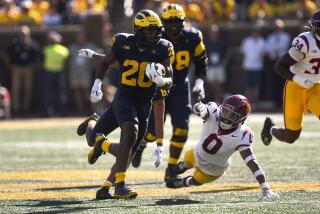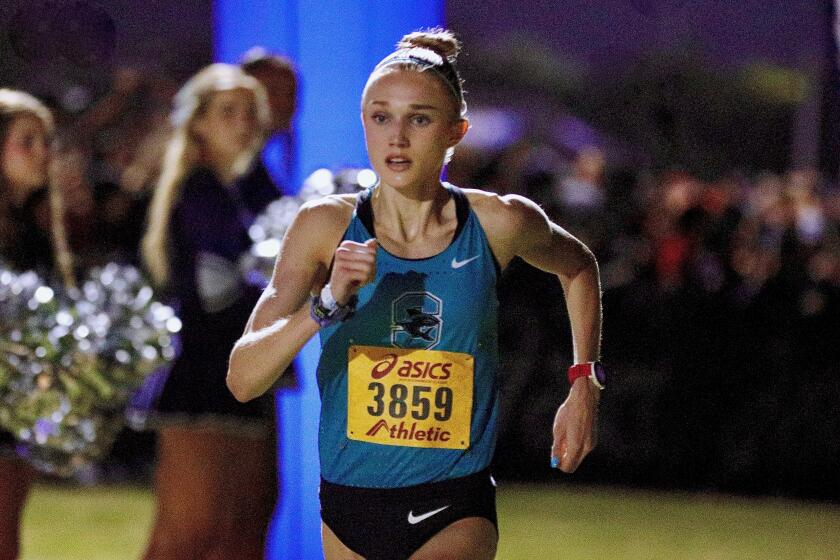For many coaches, going to the pros was a real game-changer
Going from college to the pros in coaching might be compared to stepping out of a warm house into a cold and damp Seattle winter.
Pete Carroll, get ready to turn your collar up.
Maybe there’s a reason Carroll was 33-31 as a head coach of the New England Patriots and New York Jets and 97-19 at USC.
Maybe his rah-rah personality and having candy-store pick of the talent properly correlate with the disparity between his pro/college win-loss record.
“I’m very surprised,” former Oklahoma and Dallas Cowboys coach Barry Switzer said Sunday of Carroll’s impending move. “More people would rather have the Southern Cal job than the one he just took, I promise you. You don’t leave those places.”
It’s a lie to say it can’t be successfully done. After two years at UCLA, Dick Vermeil spent 15 tear-stained seasons in the NFL, leading Philadelphia to the NFC championship and the Rams to their only Super Bowl title.
Still, Vermeil’s overall NFL record was only 11 games over .500 (120-109).
John Robinson, whose 104-34-4 mark at USC recently earned him induction into college football’s hall of fame, qualifies as a successful NFL coach, if only barely.
He twice led the Rams to the NFC title game, but his 79-74 record ultimately chased him back to the college ranks.
Switzer was an exception, winning three national titles at Oklahoma before leading Dallas to a Super Bowl victory in the 1995 season.
“But I inherited a good football team,” acknowledged Switzer, who was 40-24 in four NFL seasons.
Many college coaches met disaster at Curly Lambeau’s gates.
Bud Wilkinson, on the short list of greatest college coaches ever, was 145-29-4 at Oklahoma and 9-20 with the St. Louis Cardinals.
Tommy Prothro was 104-55-5 at Oregon State and UCLA and 35-51 with the Rams and San Diego Chargers.
John McKay led USC to four national titles in the 1960s and ‘70s and the Tampa Bay Buccaneers to a punch line on “The Tonight Show Starring Johnny Carson.”
Carnac the Magnificent: “What two disasters were accompanied by band music?”
Answer: “The Titanic and the Buccaneers.”
McKay presided over an expansion nightmare, with his Bucs losing their first 26 games and McKay ending up with an overall record of 44-88-1.
“My dad told me that, looking back on it, he knew within the first week he got to Tampa he’d made a mistake,” J.K. McKay told The Times in 2007.
Mike Riley, Steve Spurrier, Nick Saban and Butch Davis might concur. All left solid college situations for the NFL, and all have since scurried back to campus.
Riley, considered the top candidate to replace Carroll at USC, built Oregon State back to respectability in the late 1990s before bolting to the Chargers, where he was 14-34 in three seasons.
Asked by the Seattle Times last summer about his NFL experience, Riley quipped: “I wouldn’t do it again.”
Spurrier’s impeccable reputation at Florida, where he won six Southeastern Conference titles from 1990 through 2001, was tainted when he failed in a two-year, 12-20 stint with the Washington Redskins.
When he returned to college in 2004 with South Carolina, Spurrier remarked, “It was a lot more fun hanging around the SEC than it was the other league.”
Saban won national titles at Louisiana State (2003) and Alabama (2009) and in between coached the Miami Dolphins to mediocrity. “I’m a college coach,” he said when he took the Alabama job in 2007. “I want to stay in college.”
Davis laid the foundation for the University of Miami’s national title in 2001 and led the Cleveland Browns to a 21-38 record before scrambling back to North Carolina.
Switzer said college and the pros are different professions.
Coaches at major collegiate powers have a better chance to succeed because they are not constrained by the socialistic principles of the NFL -- namely a salary cap and a draft that try to level the playing field.
The coach at Oklahoma, and at USC, can land as many first-round picks as the 85-scholarship limit allows.
“We don’t draft them,” said Switzer, speaking in his Oklahoma coach voice. “We go out and select them. I can find as many blue-chipper players as I want, and I did. I don’t have to wait my turn.”
Most major-college coaches also demand complete control over their programs. They don’t have to answer to higher-ups.
“Players control pro football,” Switzer said. “Owners are second. Then, if you have a strong general manager the owner listens to, he’s third. And the coach is fourth.”
At Oklahoma, he said, “I got done anything we wanted to do.”
Though winning big in college may be easier, Switzer said coaching at the college level is more taxing than in the NFL, where there is only one bottom line: Win the Super Bowl.
In the NFL, Switzer said, “you don’t have to deal with Reggie Bush’s problems.”
Switzer, who at Oklahoma had his share of run-ins with the NCAA, wondered if that’s the reason Carroll is leaving.
“In the pros, you don’t have to know the siblings,” Switzer said. “It’s totally impersonal. You coach anyway you want. And you only have 53 of them. In college, I used to have a couple of hundred of them.
“Academics, summer jobs, disciplinary problems, there are so many things. Study hall, eligibility -- college football is a different mission.”
Carroll, of course, is going back to a league he knows well.
Some would argue that his strengths as a college coach -- recruiting and relentless, boyish enthusiasm -- do not translate to the pro game.
Defensive end Lawrence Jackson, who played for Carroll at USC and will be reunited with him in Seattle, thinks that his former boss can adjust.
“I think he’s smart enough to know he’s not dealing with 18- to 22-year-olds,” Jackson said.
“Guys are professionals, and his beliefs, they’ll be accepted. I don’t think he’ll have a hard time with guys in the league.”
Switzer, of course, thinks Carroll is crazy.
“SC is one of the great jobs in the world,” he said.
Times staff writer Gary Klein contributed to this report.
More to Read
Go beyond the scoreboard
Get the latest on L.A.'s teams in the daily Sports Report newsletter.
You may occasionally receive promotional content from the Los Angeles Times.











